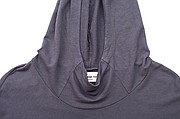Dodging Retail Blues, Designer Tries Amazon
Retail
As of Monday, April 17, 2017
Maya Reynolds recently wrapped up a gig creating costumes for the Backstreet Boys. The 1990s hit makers are wearing her white leather jackets for a residency at Planet Hollywood Resort & Casino in Las Vegas.
Outfitting the Backstreet Boys is one of Reynolds’ long line of jobs designing clothes favored by prominent rockers such as Lenny Kravitz, Steven Tyler and Chris Martin of Coldplay. But even in the best of times, independent designers must scramble for funds to finance their ventures.
Reynolds said that even retailers with a taste for unique and adventurous styles have been playing it safe recently. The tough state of retail compelled her to become more entrepreneurial. She recently launched a basics line called Uncommon Thrds, which she intends to sell direct-to-consumers. But she is not entirely going at it alone. She is selling Uncommon Thrds on Amazon.com. In March, she introduced her Amazon e-boutique at www.amazon.com/shops/uncommonthrds.
Since the venture is new, Reynolds made no forecast on how much she will earn from the new enterprise. But she believes it will support production of her 6-year-old “artisanal” brand, Clade Man, which has drawn attention from stylists and rockers. Headquartered in downtown Los Angeles, the line features unique looks in limited quantities, sometimes fewer than 20 garments per style. Performers also work with her brand’s Clade Custom division for one-of-a-kind pieces.
The Amazon venture started in late 2016 when buyers from Amazon contacted her and pitched the idea of running a direct-to-consumer store for Clade. Reynolds demurred but pitched them doing a store for Uncommon Thrds, on which she was already working.
In the following months. Reynolds gave Amazon a lot of content, including pictures, text describing the clothes and information on sizing. A lot of her information was for the proverbial front end of the shop. Amazon provided the back end of the store, such as the Web hosting to produce the store and shipping.
Although Clade made its debut just as e-commerce was beginning to skyrocket, Reynolds didn’t consider the burgeoning market as an appropriate forum for Clade. The brand was more of a couture experience that required a visit to her downtown Los Angeles atelier or a boutique run by one of her partners. Also, e-commerce seemed like another full-time job for the already busy Reynolds.
But a basics line, even one with an avant-garde edge, seemed more of an easier fit online. The elevated knitwear line is made in Los Angeles. Among the debut collection’s silhouettes are T-shirts and hoodies with details such as scooped hems and contrast panels. The retail price point for the line ranges from $97 to $110, which includes shipping.
Reynolds said the basics line is not exclusive to Amazon. So far, Reynolds is pleased with Amazon doing the back-end grunt work for the e-store. “It’s completely transparent on a certain level,” Reynolds said. She said that she can view her store’s sales reports online. She also can see how many people shopped her line by getting a report on the clicks. Amazon sales managers are also frequently available to consult on how to increase sales, she said.
Amazon hopes to attract more new brands to its merchandising mix, according to Elisabeth Rommel, director of marketplace softlines at Amazon. “We’re focused on recruiting and supporting new fashion brands like Uncommon Thrds, by offering marketing and distribution opportunities to help them succeed and grow their businesses through selling on Amazon,” she said.
The Seattle-headquartered Amazon is one of the giants of retail and is often considered a rival to Walmart Stores Inc., the biggest retailer in the United States. Amazon has made headlines with its ventures into prestige TV and technology. In 2011, it made a bigger move into fashion. It hired traditional merchandisers such as Amy Glick, formerly of Nordstrom Inc., to work as merchandise managers for its fashion division. According to Glick’s LinkedIn profile, she worked fashion at Amazon until October 2013.
Amazon also signaled a deeper dive into fashion in 2012 with full-page ads in glossy magazines. In 2013, Amazon division Shopbop introduced a contemporary menswear e-commerce emporium, East Dane. Amazon sells fashion from brands such as Tommy Hilfiger, Calvin Klein, Jessica Simpson, Vince Camuto and Ivanka Trump. The company’s own labels include women’s labels Lark & Ro, Society New York, James & Erin and North Eleven; men’s lines Franklin & Freeman and Franklin Tailored; and children’s line Scout + Ro.
Amazon is building a bigger presence in California in July. It announced that it would open a fulfillment center in Sacramento. The compound will serve as the company’s 10th fulfillment center in California. It currently runs other centers in Moreno Valley, Patterson, Redlands, Rialto, San Bernardino and Tracy.
Amazon might just be getting started as a big player in fashion.
Lenny Gordon, co-leader of accounting and advisory firm Marcum’s Retail & Consumer Products Group, said that Amazon should be on every retailer’s radar. “In my mind, Amazon will try to dominate every category. Fashion is part of apparel and they are trying to dominate apparel,” he said. [Amazon is] doing a great job in sports goods; apparel is a growing market for them.”
For those selling on Amazon, there are two levels of dealing with the sprawling retailer. There’s a level where a vendor gives Amazon a 15 percent referral fee for every item sold. If the vendor goes on the Amazon Exclusives program, they give a 20 percent referral to Amazon. In return for paying more, they get the benefits of Amazon’s predictive analytics, which drives consumers to various e-boutiques, Gordon said.
If a vendor sells a $500 dress on Amazon Exclusives, the vendor will give Amazon $100 for the sale but still take $400 from the deal. Gordon estimated that in a similar deal with a traditional department store, a vendor might take away $250 after paying fees for the traditional store’s margins and sales representatives.

